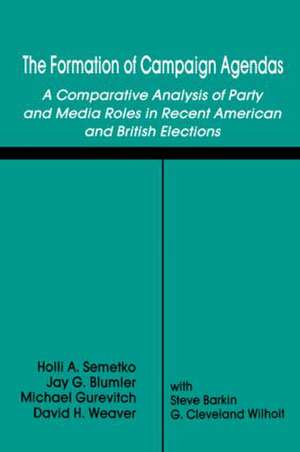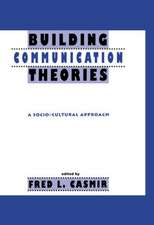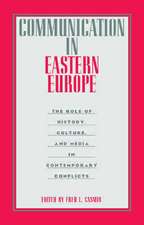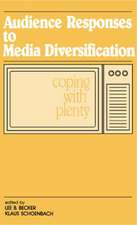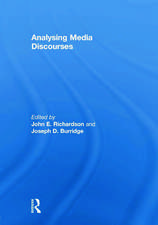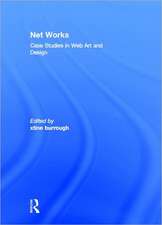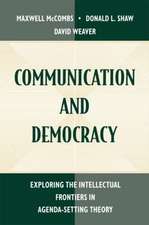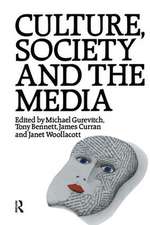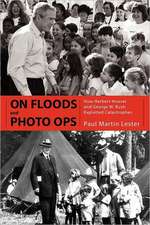The Formation of Campaign Agendas: A Comparative Analysis of Party and Media Roles in Recent American and British Elections: Routledge Communication Series
Autor Holli A. Semetko, Jay G. Blumler, Michael Gurevitch, David H. Weaver, Steve Barkinen Limba Engleză Paperback – 9 dec 2011
* to assess the extent and limits of media power in election campaigns
* to extend the concept of media agenda-setting to include the contributions of powerful news sources in the process of election agenda formation
* to evaluate the impact of national system variables (differences in political and media systems) on the balance of party and media forces in the formation of campaign agendas
In the process, it searches for ways of measuring the discretionary power of the media in electoral politics, testing this in terms of the relative ability of journalists and politicians to shape election campaign agendas.
Din seria Routledge Communication Series
-
 Preț: 156.78 lei
Preț: 156.78 lei - 9%
 Preț: 575.54 lei
Preț: 575.54 lei -
 Preț: 155.43 lei
Preț: 155.43 lei - 8%
 Preț: 441.77 lei
Preț: 441.77 lei - 8%
 Preț: 415.39 lei
Preț: 415.39 lei - 9%
 Preț: 576.43 lei
Preț: 576.43 lei - 15%
 Preț: 404.22 lei
Preț: 404.22 lei - 8%
 Preț: 495.22 lei
Preț: 495.22 lei - 8%
 Preț: 509.90 lei
Preț: 509.90 lei -
 Preț: 392.96 lei
Preț: 392.96 lei - 8%
 Preț: 516.77 lei
Preț: 516.77 lei - 8%
 Preț: 460.12 lei
Preț: 460.12 lei - 8%
 Preț: 387.37 lei
Preț: 387.37 lei -
 Preț: 416.20 lei
Preț: 416.20 lei - 15%
 Preț: 431.10 lei
Preț: 431.10 lei -
 Preț: 364.94 lei
Preț: 364.94 lei -
 Preț: 363.96 lei
Preț: 363.96 lei - 22%
 Preț: 325.34 lei
Preț: 325.34 lei - 15%
 Preț: 463.49 lei
Preț: 463.49 lei - 15%
 Preț: 464.31 lei
Preț: 464.31 lei -
 Preț: 366.85 lei
Preț: 366.85 lei -
 Preț: 264.53 lei
Preț: 264.53 lei - 16%
 Preț: 247.75 lei
Preț: 247.75 lei -
 Preț: 354.28 lei
Preț: 354.28 lei -
 Preț: 374.27 lei
Preț: 374.27 lei - 22%
 Preț: 321.54 lei
Preț: 321.54 lei -
 Preț: 418.13 lei
Preț: 418.13 lei -
 Preț: 481.52 lei
Preț: 481.52 lei -
 Preț: 432.29 lei
Preț: 432.29 lei -
 Preț: 498.91 lei
Preț: 498.91 lei -
 Preț: 369.73 lei
Preț: 369.73 lei - 24%
 Preț: 133.28 lei
Preț: 133.28 lei - 31%
 Preț: 325.43 lei
Preț: 325.43 lei - 25%
 Preț: 769.37 lei
Preț: 769.37 lei -
 Preț: 447.05 lei
Preț: 447.05 lei - 18%
 Preț: 722.88 lei
Preț: 722.88 lei -
 Preț: 389.60 lei
Preț: 389.60 lei -
 Preț: 249.75 lei
Preț: 249.75 lei -
 Preț: 395.37 lei
Preț: 395.37 lei -
 Preț: 363.96 lei
Preț: 363.96 lei - 18%
 Preț: 1004.72 lei
Preț: 1004.72 lei - 18%
 Preț: 998.71 lei
Preț: 998.71 lei -
 Preț: 380.22 lei
Preț: 380.22 lei - 26%
 Preț: 243.26 lei
Preț: 243.26 lei -
 Preț: 97.53 lei
Preț: 97.53 lei -
 Preț: 242.11 lei
Preț: 242.11 lei - 20%
 Preț: 402.68 lei
Preț: 402.68 lei -
 Preț: 225.90 lei
Preț: 225.90 lei -
 Preț: 386.14 lei
Preț: 386.14 lei -
 Preț: 241.09 lei
Preț: 241.09 lei
Preț: 433.90 lei
Nou
Puncte Express: 651
Preț estimativ în valută:
83.03€ • 86.91$ • 69.10£
83.03€ • 86.91$ • 69.10£
Carte tipărită la comandă
Livrare economică 31 martie-14 aprilie
Preluare comenzi: 021 569.72.76
Specificații
ISBN-13: 9780415515559
ISBN-10: 0415515556
Pagini: 216
Dimensiuni: 152 x 229 x 12 mm
Greutate: 0.4 kg
Ediția:1
Editura: Taylor & Francis
Colecția Routledge
Seria Routledge Communication Series
Locul publicării:Oxford, United Kingdom
ISBN-10: 0415515556
Pagini: 216
Dimensiuni: 152 x 229 x 12 mm
Greutate: 0.4 kg
Ediția:1
Editura: Taylor & Francis
Colecția Routledge
Seria Routledge Communication Series
Locul publicării:Oxford, United Kingdom
Public țintă
ProfessionalCuprins
Contents: M. McCombs, Foreword. The Formation of Campaign Agendas in the United States and Britain: A Conceptual Introduction. The British and American Political Communication Systems and Election Campaigns: Cross-National Similarities and Differences. Key Features of the Comparative Research Design. The Election Agenda-Setting Roles of Television Journalists: Comparative Observation at the BBC and NBC. Influences on the Campaign Agenda in the 1984 American Presidential Election. Influences on the Campaign Agenda in the 1983 British General Election. The Formation of Television Agendas in British and American Campaigns. The Formation of Press Agendas in British and American Campaigns. In Conclusion: What Have We Learned?
Recenzii
"...an outstanding study of how politicians attempt to set campaign agenda and how the press in each country deals with it."
—CHOICE
"...an important contribution to agenda-setting research, expanding its boundaries....well worth reading for anybody interested in the field, whether they be scholars or students."
—European Journal of Communication
"This is a major study....Scholars who are interested in political agenda-setting...will need to consider it carefully."
—Journalism Quarterly
"...this study is soundly done and makes a useful contribution to our knowledge about electoral procedures in Britain and the US."
—British Politics Group Newsletter
"This is a methodical, meticulous, thoughtful, and judicious study that significantly advances agenda-setting research."
—Journal of Communication
"This ambitious comparative study solidly establishes a new era in agenda-setting research that centers, as the title of the book aptly puts it, on the formation of media agendas. This book examines the degree of discretionary power that journalists possess to set the daily news agenda during an election campaign. The question is explored in an exemplary way, not only through the comparison of British and American practice, but also through the simultaneous examination of the political parties, news media practitioners and their organizations, and the news agenda. The detailed content analysis of campaign coverage reveals a variety of interesting cross-cultural differences.
This book will create new insights into the agenda-setting process. Whether you approach the present journey and the exploration of the future as a journalist, political participant, or scholar, this book is your best passage."
—Maxwell McCombs
University of Texas, Austin from the Foreword
—CHOICE
"...an important contribution to agenda-setting research, expanding its boundaries....well worth reading for anybody interested in the field, whether they be scholars or students."
—European Journal of Communication
"This is a major study....Scholars who are interested in political agenda-setting...will need to consider it carefully."
—Journalism Quarterly
"...this study is soundly done and makes a useful contribution to our knowledge about electoral procedures in Britain and the US."
—British Politics Group Newsletter
"This is a methodical, meticulous, thoughtful, and judicious study that significantly advances agenda-setting research."
—Journal of Communication
"This ambitious comparative study solidly establishes a new era in agenda-setting research that centers, as the title of the book aptly puts it, on the formation of media agendas. This book examines the degree of discretionary power that journalists possess to set the daily news agenda during an election campaign. The question is explored in an exemplary way, not only through the comparison of British and American practice, but also through the simultaneous examination of the political parties, news media practitioners and their organizations, and the news agenda. The detailed content analysis of campaign coverage reveals a variety of interesting cross-cultural differences.
This book will create new insights into the agenda-setting process. Whether you approach the present journey and the exploration of the future as a journalist, political participant, or scholar, this book is your best passage."
—Maxwell McCombs
University of Texas, Austin from the Foreword
Notă biografică
Holli A. Semetko, Jay G. Blumler, Michael Gurevitch, David H. Weaver, Steve Barkin
